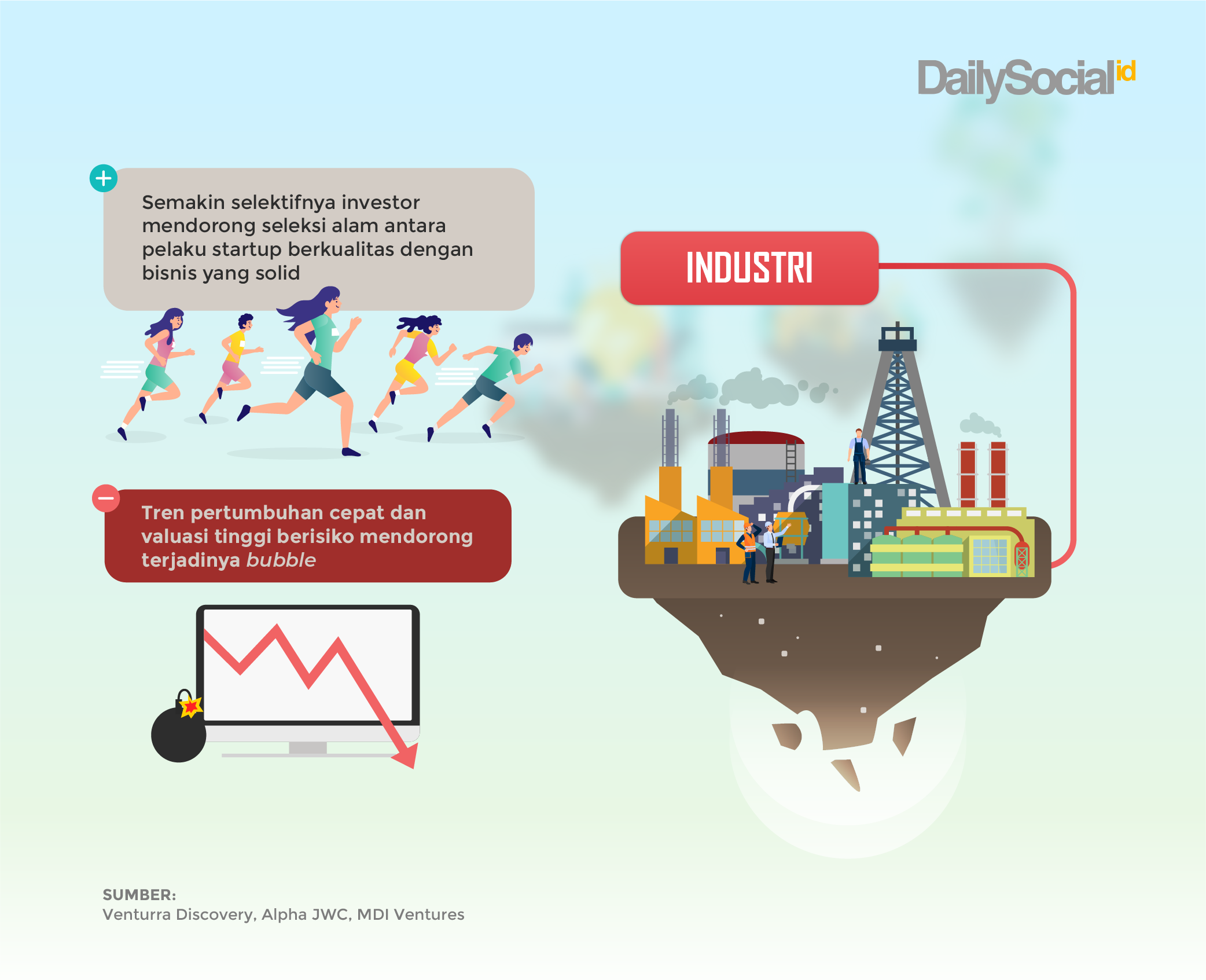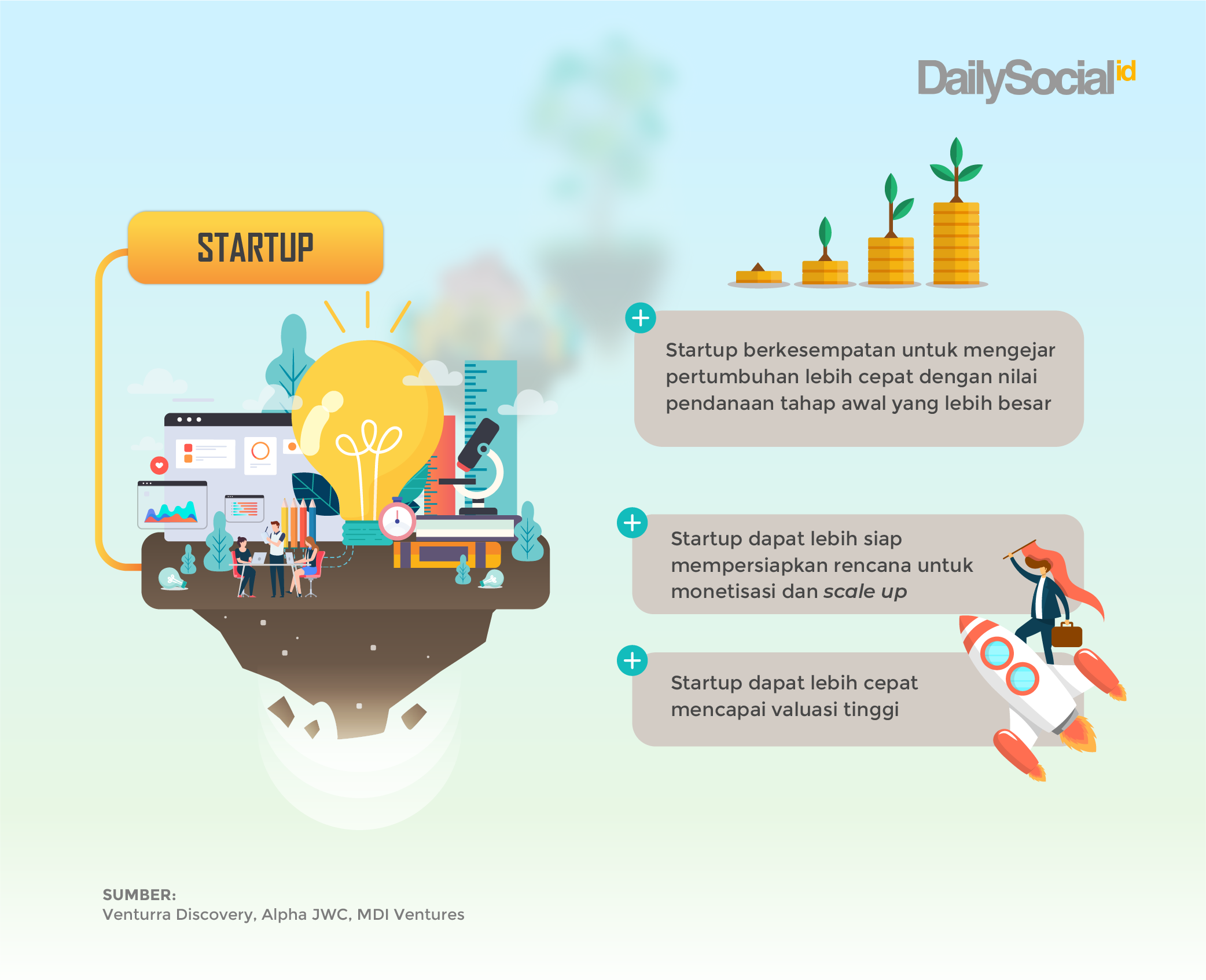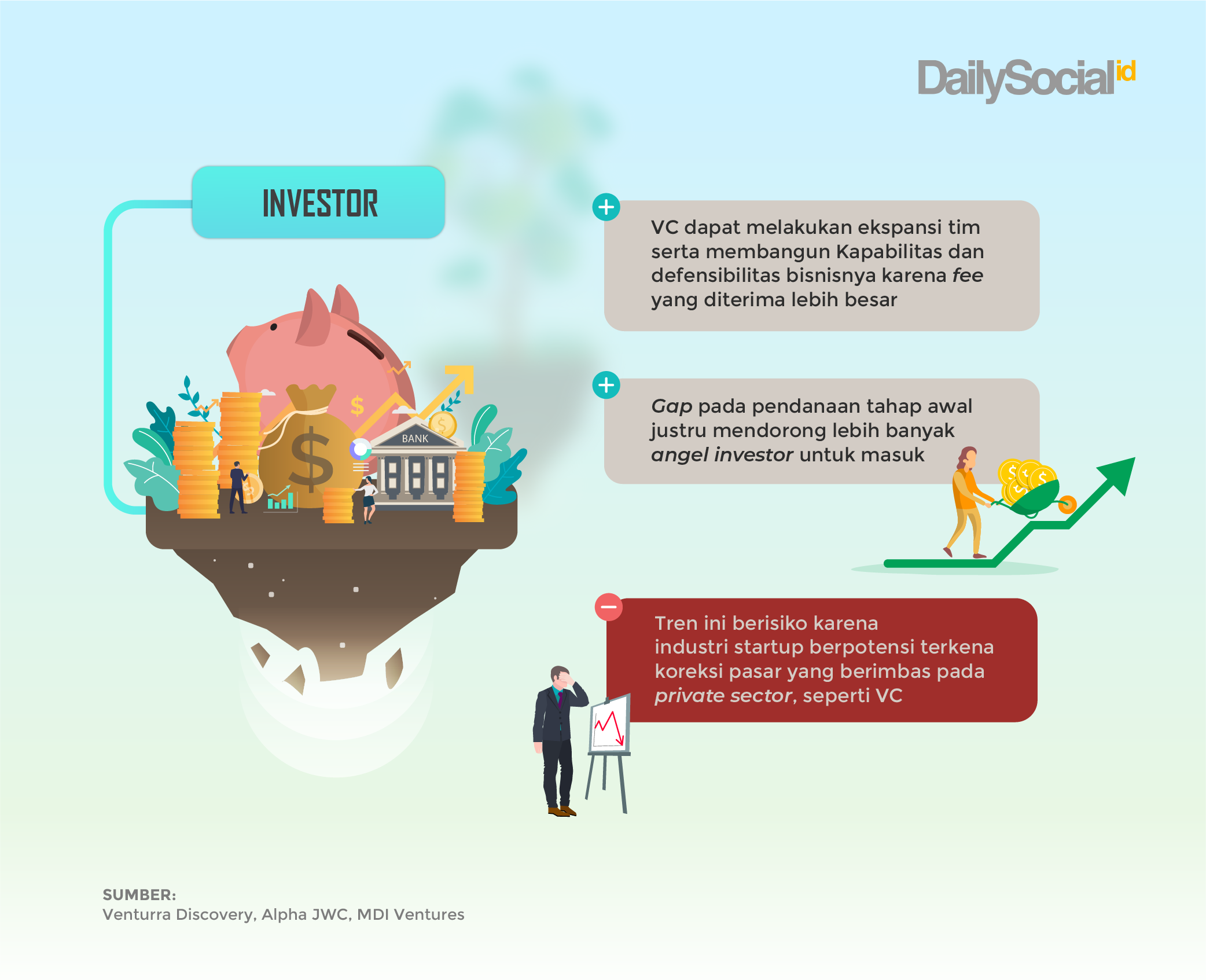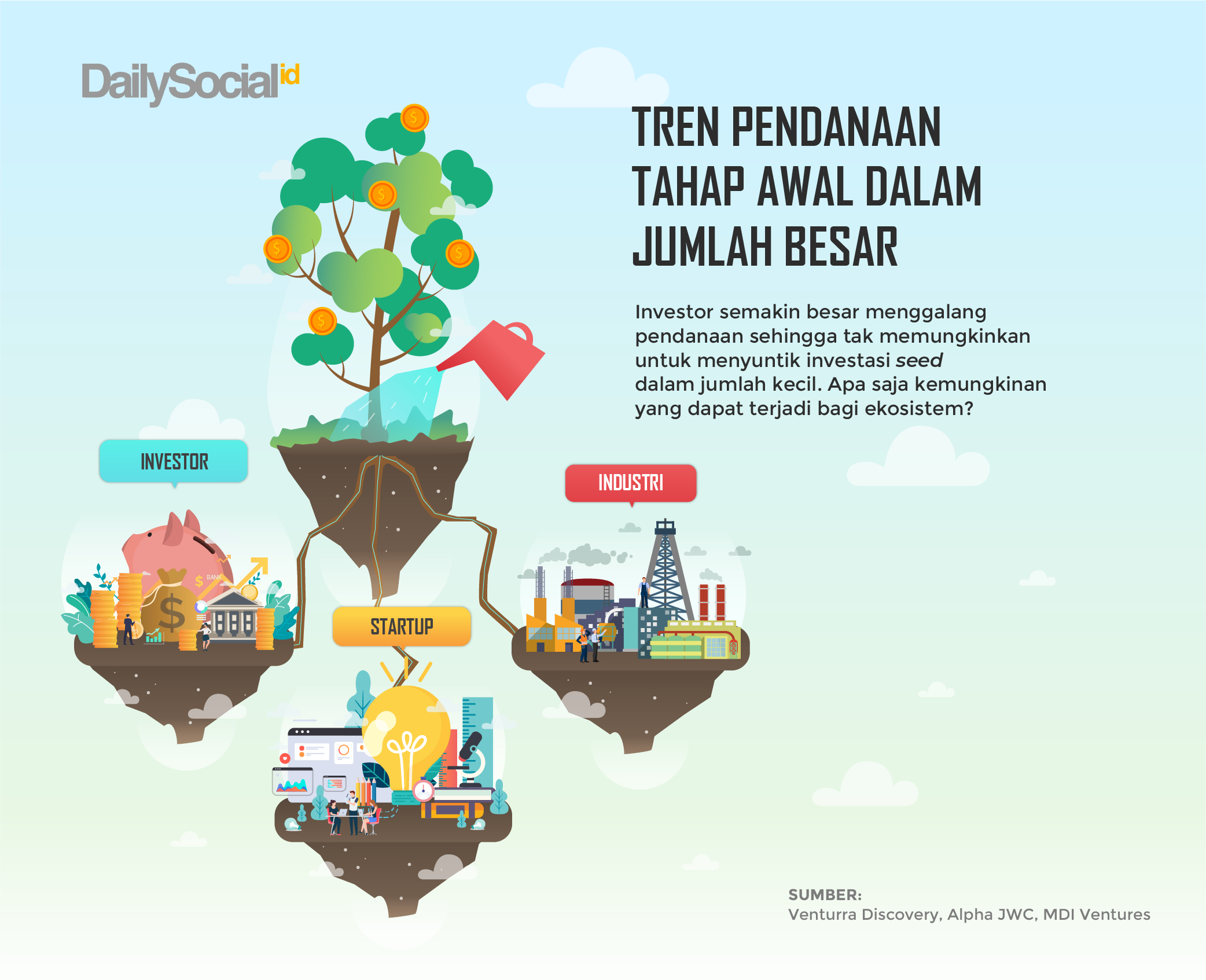Investors' Views on the Initial Funding Gap in Indonesia's Startup Industry
The seed funding is now Series A in the past, and Pre Seed is the old seed funding
The popularity of digital business in Indonesia in recent years has brought blessings to investors. In 2018, the Minister of Research, Technology and Higher Education Mohamad Nasir had mentioned that there were 956 startups in Indonesia in the last four years.
The skyrocketing startup industry has also boosted the investment climate. Startups are moving fast in developing innovations that trigger Venture Capital (VC) to invest with hope return Big and tree, the VC industry thrives in Indonesia. Deal More and more investment, cuan also increases.
To date, there are many VCs that are actively providing funding in Indonesia. The focus is diverse, ranging from a focus on early-stage funding (early stage) to the final round of fundraising (later stages), as received Gojek and Tokopedia.
No one thought that the business model that they were running was successful in capturing the market in the country. Both of them now have something in common, namely they both have high valuations that have brought them to status unicorn and obtain an investment that is considered the largest funding in Indonesia to date.
Last year Tokopedia secured funding led by Softbank and Alibaba worth $1,1 billion or the equivalent of Rp16 trillion. Temporary, Gojek reportedly set to secure $3 billion in Series F funding in the near future. A fantastic number that was never thought of when they both started the business.
The more you come here, the more the startup ecosystem is formed. This has triggered a number of VCs to start actively investing in Indonesia, including the emergence of new VCs, such as Venturra Discovery. Our startup ecosystem is also largely driven by the presence of incubator and accelerator programs.
This does not mean that the investment climate is lonely in the early days of the startup ecosystem. Co-founder and CEO of DailySocial Rama Mamuaya revealed that startup investment in 2014 was very active.
She gave an example of women's fashion e-commerce Berrybenka which received a series B funding of $5 million from TransCosmos and Gree Ventures. The figure of $ 5 million is quite large for the size of the industry that was just developing at that time. If we talk about current conditions, it is very possible for a startup to get an investment of $5 million as an early stage funding.
There are a number of factors why investors are now starting to disburse funds seed in large quantities. It could be because the industry is getting more mature until it changes mindset investors in investing in the startup industry.
Increased funding value seed and change mindset investor
The gap phenomenon (gap) in early stage funding (pre-seed, seed, and series A) actually didn't just drop by. The United States (US) market, which is the mecca of the world's digital industry, also experienced this. Given that the US digital market began in 1999, the trend for early-stage VC funding in the US is new booming in 2006.
As quoted from the article “Why Has Seed Investing Declined? And What Does This Mean for the Future?”, early-stage funding in the US had experienced a slump. This is not due to the willingness of VCs to invest in small amounts, but rather the development of technology that makes launching and developing startup products cheaper.
How about in Indonesia? Phenomenon gap This is said to have started in the last two to three years. Someone mentioned gap early-stage funding means VCs are now investing in small amounts ranging in value from $100k-$500k. There are also those who say that in fact gap this is most pronounced in series A funding.
Currently, there is no data that can show a downward trend in funding value seed for the last three or four years. This is because a number of agreements are deliberately not announced so that startups can focus on building products and avoid market publicity. As a result, the currently available data only shows the number of deal for funding seed in the last three years.
However, in terms of the number of deals, the initial funding growth was not very significant. Startup Report DailySocial record the amount of funding seed (not included pre seed) experienced ups and downs, including 28 deal (2016) then went up to 32 deal (2017), and dropped drastically to 21 deal (2018). Meanwhile, series A funding experienced a drastic decrease of 19 deal (2018) from 29 deal (2017)
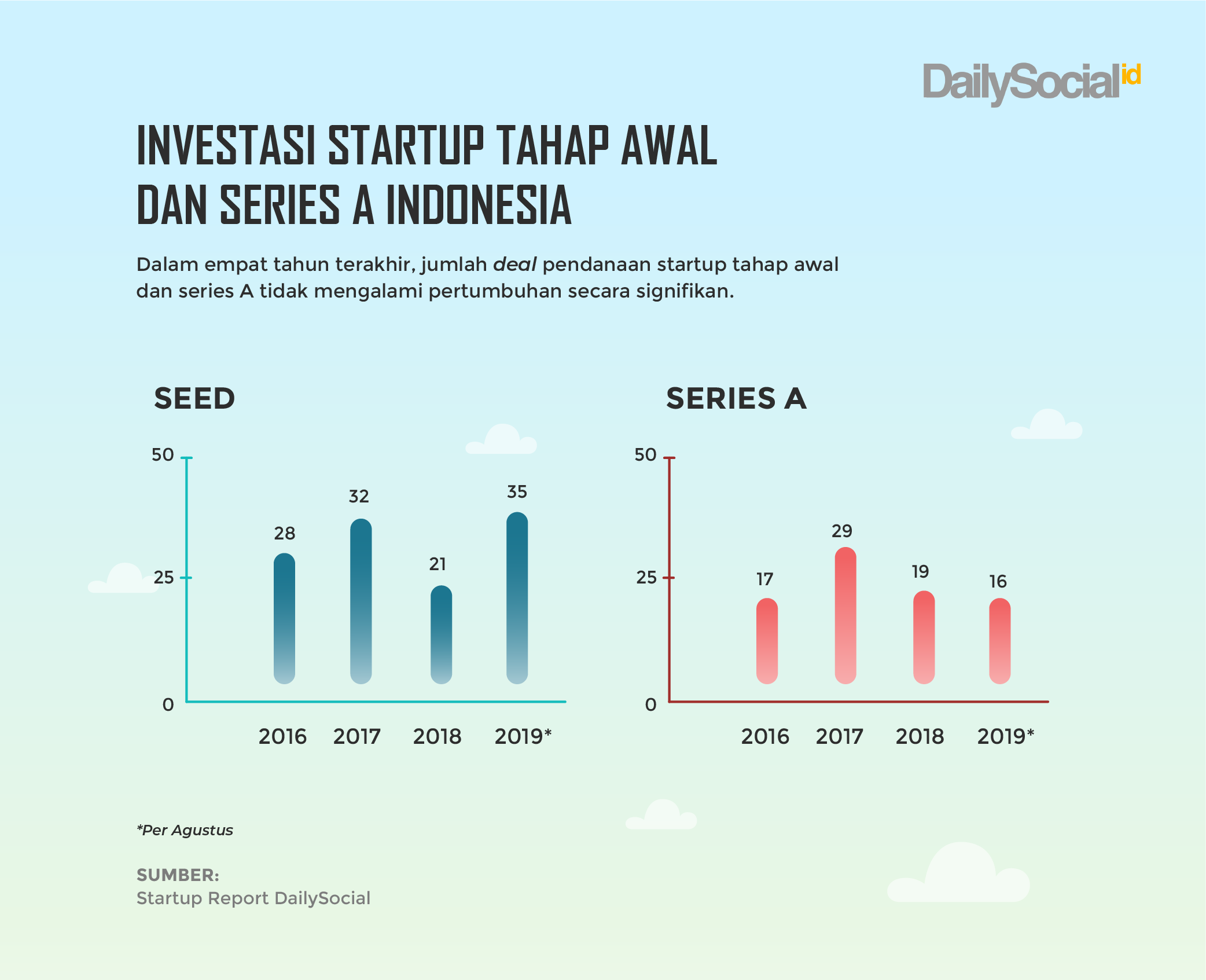
Based on interview DailySocial with a number of VCs in Indonesia, some of whom acknowledge the existence of gap the. Head of Investment MDI Ventures Aldi Adrian Hartanto rate stagewise for funding seed began to become a problem because the acquisition of investment funds managed by VCs was increasing.
For example, in the last two years, there have been several startups that have received large initial stage fundraising. For example, Ajaib received an injection of $2,1 million (Rp29,6 billion). There is another logistics aggregator platform Shipper which received an initial investment of $5 million (Rp70,1 billion).
Well, because of this trend, Aldi judged it doesn't make sense for VCs to invest in small amounts again. Instead of withholding funding seed, the VC industry actually increases the amount of investment. This condition has also made a number of VCs shift their focus to startups in Indonesia growth rounds because the experience is proven and the risk is small.
“Because of the many [investment] vacancies in seed, this condition ultimately forces startups that are still at that stage to raise funds in a larger amount at the same time,” said Aldi some time ago.
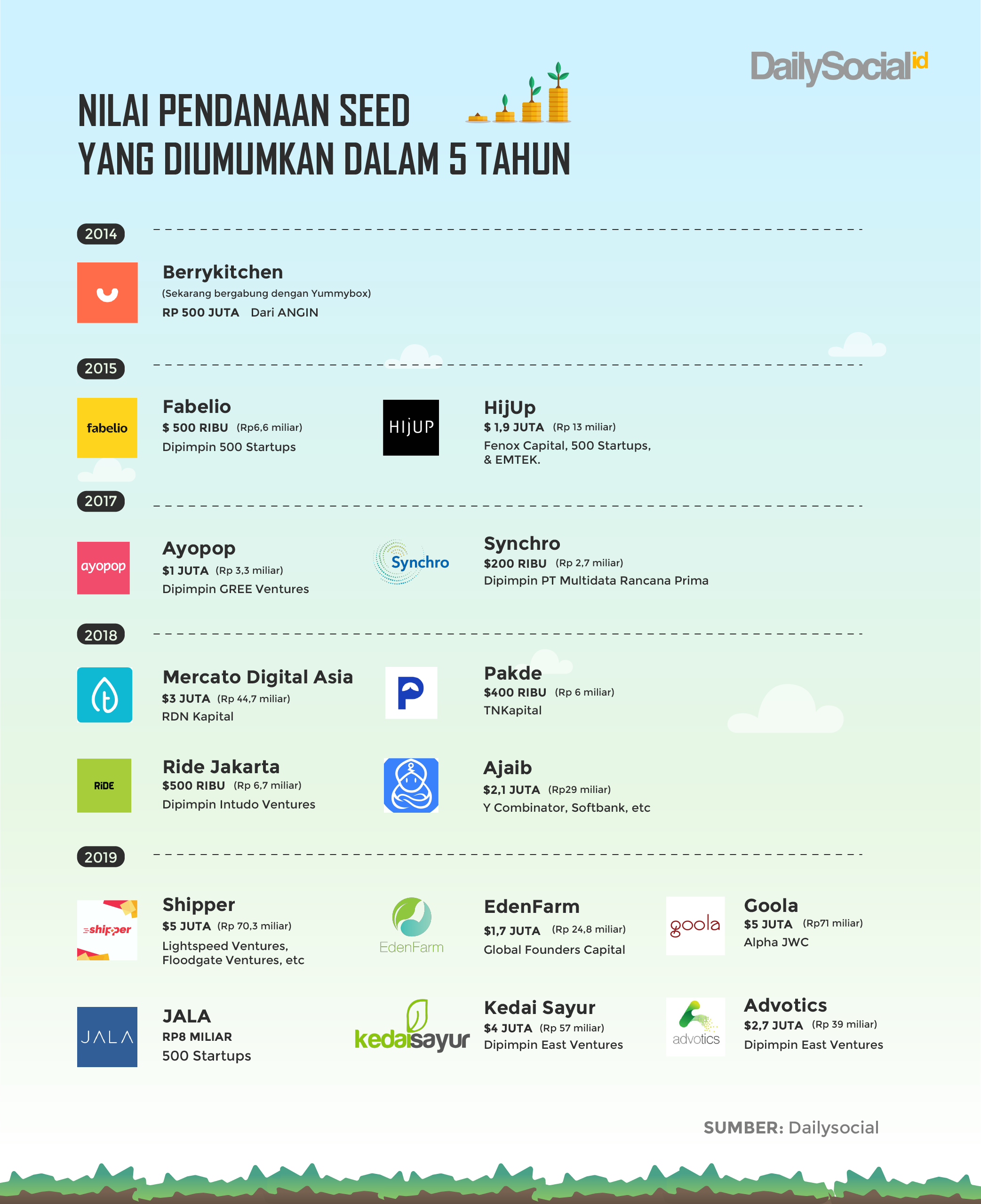
This phenomenon is in contrast to the conditions in 2014 back where at that time there was no business sector that showed its dominance. New industrial growth is growing and startups are still looking for the right business model. It makes sense if investors have not dared to invest in later stages because of the risk of failure.
Over time, the startup industry in the country has matured. Domination is starting to be shown by the success of a number of startup actors in running a business E-commerce, ride hailingand online travel. Natural selection also occurs where there are many startups that fail and investors choose the path exit Lewat mergers and acquisitions.
Now, investors are experiencing changes mindset where startups that want to raise initial funding must have a plan traction and clear monetization. In other words, investors are increasingly selective in investing.
According to him, VC companies now tend to be conservative. The hypothesis is no longer limited to the vision and mission of the founder, but including how the startup has a clear monetization plan in the next few years, ways to scale up for business development, and not only focus on seeking funding.
He considered that it would be very dangerous for investors to put large amounts of money upfront in a startup with only a product, without knowing the monetization plan to lead to profitability.
As we know, early-stage funding or commonly called seed refers to an initial investment to support a startup's business until it can generate its own money or until its next fundraiser. Early-stage startups usually don't have traction.
Partners Venture Discovery Raditya Pramana also considers that it is inappropriate for startups to raise large investments at the outset by traction which is nil. According to him, startups have to do a lot to achieve a valuation.
“In Indonesia, funding seed $1 million is normal, the valuation has gone up. The more competitive the market is, the more people want to put in large sums of money. The main thing is that people want to take large amounts of money with large valuations," he said.
This man who is familiarly called Adit judges gap early-stage funding began to gradually shrink in line with the emergence of new VCs focused on filling funding gaps seed in Indonesia.
The impact on the VC industry and startups
Mindset investors still refer to money. Providing a large initial investment is certainly risky. But there are benefits to be felt for investors and startups. We noted several important points from VCs regarding their impact on the startup ecosystem in Indonesia.
JWC Alpha Partner Erika Dianasari assesses the reduction in VC funding in seed actually open pintu for angel investors to invest in Indonesia. On the other hand, the trend of larger initial funding can actually strengthen the foundations of investors founder startups to be more active in building their businesses.
"Another important point is that natural selection will occur between quality players and solid businesses. When investors see the huge potential of startups, why don't we invest more? That way the team can focus on building milestone while freeing founder from other distractions," he explained to DailySocial.
Meanwhile, according to Aldi, the trend Early-stage funding with a large value provides added value for startups to have the opportunity to achieve early growth faster than before. With this funding, startups can maximize product development in order to attract traction and accelerate the achievement of valuation.
We cannot compare the achievement of valuation in the past five years. Startups are still having trouble producing traction due to a number of factors, such as the immature digital ecosystem in Indonesia, minimal infrastructure, and low awareness society towards digital services at that time.
"Startups can grow faster because they are supported by large funding. This is certainly good [for the startup industry], but it can be bad because it can create a bubble [of the economy]. This should be avoided so that [funding] seed bisa Libra again," said Aldi.
Meanwhile, Adit assessed the high fundraising for seed can drive the VC industry. According to him, the higher the investment disbursed, the bigger it will be fee pocketed VC. This means that the company can take advantage of this advantage to expand the team, as well as build the capability and defencesibility of a VC.
He gave an example, fundraising for $10 million and $100 million would have different management, as well fee received. Imagine if VCs got two percent fee or $2 million per year from $100 million, of course this is more profitable for VC business development.
"As an investor, if you buy goods because they are of good quality but the profit is small, what do you do? Well, if I pay a lot now [investing in seed], it's okay because the valuation will be large," said Adit.
On the other hand, Adit predicts the trend of seed funding in ticket sizes the bigger one will continue until it happens market corrections massive one. According to him, if market corrections in the stock market, this will have an impact on the valuation of the startup it finances and make private markets like VC fell down.
From the explanation above, we can agree that early-stage funding in Indonesia is still quite active, although not growing significantly. That too, VC has changed mindset invest in line with the development of the industry and digital business landscape in Indonesia.
Investment opportunities in Indonesia are limitless considering that VCs no longer inject funding into startups that develop purely technological products. Now, VCs have also started to enter startups tech enabler with conventional business models, such as coffee chain and traditional stalls.
Borrowing a term, trend "funding" seed the present is a series A in the past, and pre seed is seed long" in Indonesia has actually now begun.
Marsya Nabila contributed to the creation of this in-depth article.
Sign up for our
newsletter
